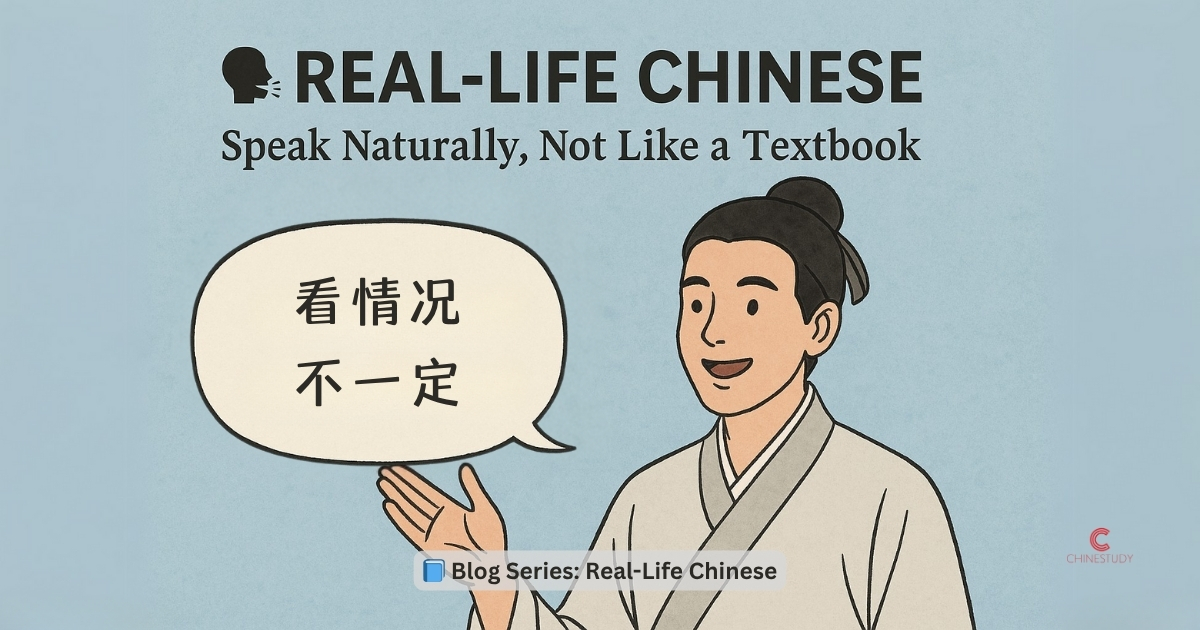🗣️ How to Say “It Depends” Naturally in Chinese — Not Just “我不知道”

🚫 Textbook Chinese
我不知道。
(Wǒ bù zhīdào.)
→ I don’t know.
Sure, it works.
In real life, Chinese speakers often skip the direct “I don’t know” and use condition-based phrases instead — just like in English we might say “It depends.”
✅ Real Chinese: Try These Instead
- 看情况 (kàn qíngkuàng) — “It depends on the situation.”
-
不一定 (bù yídìng) — “Not necessarily.” / “It depends.”
These sound flexible, thoughtful, and more conversational than a flat “I don’t know.”
💡When to Use Them
These phrases are about making the decision based on conditions.
Use them when:
-
The answer changes depending on specific factors.
-
You want to avoid a definite “yes” or “no.”
-
You’re leaving space for flexibility without committing.
Think of them as the “it depends” tool in your Chinese toolkit.
🧱 Example Sentences
1.
A:你会参加明天的活动吗?
(Nǐ huì cānjiā míngtiān de huódòng ma?)
→ Will you join tomorrow’s event?
👉 看情况吧。
(Kàn qíngkuàng ba.)
→ It depends (on the situation).
2.
A:他明天会来吗?
(Tā míngtiān huì lái ma?)
→ Will he come tomorrow?
👉 不一定。
(Bù yídìng.)
→ Not necessarily.
3.
A:你会去旅游吗?
(Nǐ huì qù lǚyóu ma?)
→ Will you travel?
👉 看情况,如果工作不忙就去。
(Kàn qíngkuàng, rúguǒ gōngzuò bù máng jiù qù.)
→ It depends — if work isn’t busy, then I’ll go.
🤓 Why It Sounds Better
- Adds nuance — you’re not giving a black-and-white answer.
-
Matches how Chinese people naturally leave room for change.
-
Sounds flexible and adaptable, not blunt.
⚠️ Common Mistake
🚫 Saying “我不知道” in every unclear situation.
It can sound like you haven’t thought about it at all.
✅ Use 看情况 / 不一定 to show you’ve considered it — but your answer depends on the circumstances.
🏆 Quick Practice
Someone asks:
“你会来帮忙吗?”
(Nǐ huì lái bāngmáng ma?)
→ Will you come help?
Which sounds more natural?
A. 我不知道。 (Wǒ bù zhīdào.)
B. 看情况。 (Kàn qíngkuàng.)
✅ Correct answer: B — It shows thought and flexibility.
✨ Final Thoughts
Next time you’re unsure, don’t stop at “我不知道.”
Try one of these softer, more flexible phrases instead — they’ll make you sound thoughtful, polite, and more in control of the conversation.
💬 看情况 (kàn qíngkuàng) — It depends on the situation.
💬 不一定 (bù yídìng) — Not necessarily / It depends.
In Chinese, it’s not just about giving an answer — it’s about keeping the conversation warm and open.
📘 Want more like this? Check out the full blog series: Real-Life Chinese
Thank you for subscribing!
Have a great day!